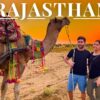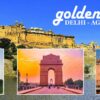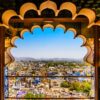Festivals in Rajasthan
Rajasthan is a cheerful state that celebrates its vibrant culture through an array of fairs and festivals running all year round, adding numerous colors to the arid land of the state. These glaring fairs and festivals come with a chance for the travellers to delve into the art, culture, and traditions that are very nicely interwoven with the state’s royal history. Rajasthan is a unique place that believes in celebrating life. And to savour the true flavours of this amazing land, visit during this festivity and become a part of it.
These varieties of fairs and festivals infuse life into the barren land of Rajasthan and fill the colours of joy all around. Out of all of such festivities, some of the major ones are Ashwa Poojan, Navratri, Guru Purnima, Mt. Abu: Summer and Winter Festival, Pushkar Fair, Gangaur Festival, Nagaur Festival, Kite Festival, Kumbhalgarh Festival, Teej, Marwar Festival, Summer Festival, Baneshwar Fair, Sheetla Mata Fair, Elephant Festival, Camel Festival, Desert Festival, Pushkar Fair and Urs Fair, that are celebrated in different parts of Rajasthan. Also, Hindus one of the biggest festivals Dussehra and Diwali are also celebrated with much grandeur and the display of fireworks.
To add more fun to these celebrations there are various activities and competitions that are organised like turban tying competition, puppet shows, camel races, Mr. and Miss. Desert competition, folk music and dance performances, cock and bull fighting, camels and cattles trading. These occasions serve as an exceptional platform to showcase state’s traditional artifacts and handicrafts where the shopaholics and art lovers can gather a lot of fun.
Jaisalmer Desert Festival Rajasthan
Golden days and colourful evenings paint a perfect picture of the Jaisalmer’s Desert festival.

About Jaisalmer Desert Festival
On a normal day the remote and unspoiled Thar Desert looks quite calm and composed, however it comes to life during the three days’ cultural extravaganza which takes place amidst the beautiful sand dunes of Jaisalmer. No matter how barren and unexplored the location is, visitors can’t resist taking a glimpse of the festival. Set against the backdrop of the majestic Jaisalmer fort, the Desert festival is perfect personification of the traditional culture of Rajasthan. The state tourism department impeccably organizes this festival every year with an intention to exhibit the imperial state culture of Rajasthan. Dressed brilliantly in colourful and traditional attire, the three-day festival commences with a procession from the Jaisalmer fort, spreading euphoria everywhere. First day, the artists and performers put up a great show performing Rajasthani art, folk dance and music for the visitors setting a perfect tempo of the festival. As the day progresses Rajasthani competitions such as turban tying, longest moustache, fire dance and Mr. and Mrs. Desert keep the visitors engaged. Following day too engages the audience with various games and art performed by local women ending it with music and dance. The last day is planned in the superb setting of Sam dunes where the most prestigious camel rides and camel races are held. The festival winds up with the traditional Rajathani folk music.
Dates of the festival: The festival is celebrated for three days in the month of February, such that the last day falls on the full moon day.
Special highlights of the festival:
- Since the last day of the festival falls on a full moon day, the melodies of the musical concert conducted under the starry night will get etched in your memory forever.
- The camel race is also one of the best activities of this festival. The animal is decked up beautifully while the artists are seen doing various acrobatics on the camel back.
- Since the festival is conducted in the desert, it’s an ultimate experience to camp in the desert near the sand dunes.
- The festival also offers an assortment of local delicacies which makes it even more interesting for food lovers to attend this festival.
- Souvenirs and handicrafts which are locally made are a good option to take back and retain them as a memory.
Camel Festival Bikaner
Honouring the ship of the desert, the Camel Festival in Bikaner is the perfect amalgamation of culture, tradition, and history, and is indeed a must-see.

About Camel Festival Bikaner
The city of Bikaner is famous for being the only camel breeding region therefore; the association of Camel and Bikaner go a long way. Desert is known for its extreme climatic condition, during summers, the scorching heat is unbearable while the cold winters are at times difficult for survival too. Having sailed through such climatic conditions and being loyal to the land of Bikaner, camels are an integral part of Rajasthan and thus, dedicating a festival to respect them is a given.
Although the festival is camel-centred, Rajasthani folk dance and music add a huge charm to this popular event in Bikaner. Set against the background of Junagarh fort in Bikaner, the festival is not less than a carnival where camels are adorned with colourful ornaments. The popular festival in Bikaner is conducted in the chilling month of January; however, it doesn’t deter tourists to attend this festival in large numbers. It starts with the colourful camel parade giving a tribute to this giant mammal. This is followed by exhilarating performances and camel rides. Other activities which make the festival even more interesting are Camel dance, Camel Tug of war, beauty pageants of camels, best breed competition and various acrobatics. Engrossed tourists cheer these competitions to their fullest capacity, thereby encouraging the participants to deliver more. It is quite extraordinary to have the rustic terrain of Bikaner offer such interesting moments to experience.
Dates of the festival: Camel festival is celebrated for two days in the month of January
Special highlights of the festival:
- Visitors can try the special tea and sweets made from Camel milk.
- Visitors can try the special tea and sweets made from Camel milk.
- Various stalls arranged in the festival offer exquisite jewellery, handicrafts, artefacts, pottery etc. for sale.
- Camels participating in this festival who are bred and trained in this region are later enrolled in the Indian army.
- There are puppet shows which have dolls dressed in colourful attire to narrate folklores.
- The festival gets a grand closure on the last day. Stunning fireworks along with the glittering lights make the desert area of Bikaner look no less than a paradise.
Nagaur Cattle Fair Rajasthan
About Nagaur Cattle Fair
Rajasthan’s rich history, majestic forts, palaces and captivating lakes do make the state popular for tourism; however, it is the fair and festivals which add icing on the cake and make it a preferred tourist destination. A small town of Nagaur situated between Jodhpur and Bikaner hosts the second-largest cattle fair in India. For the first time visitors, it is astonishing to witness camels, horses, cows, goats and sheep traded in such high volumes. Situated in the Thar Desert, the land of Nagaur is infertile for agriculture; therefore, the villagers make the livelihood by breeding camels and selling it to the neighbouring regions like Haryana and Punjab. The camels are meticulously taken care by their owners, ensuring that they sell at a high price. The bullocks too are healthy and fit, which attract a large number of buyers. While there is earnest bargaining which happens between the owners and buyers, the fair also has many other cultural activities. It is a delight to watch the folk music and dance performed by the locals dressed in their traditional attire. The very popular activities like tug of war, cockfights, camel and bullock races along with jugglery show, puppet show, etc; also keep the visitors engaged. In all, the four-day Naguar fair is a mix of entertainment, fun and frolic and should be in your bucket list during Rajasthan visit.
Dates of the festival: 30 January to 2 Feb 2020
Naguar fair is held every year in the month of January or February for four days.
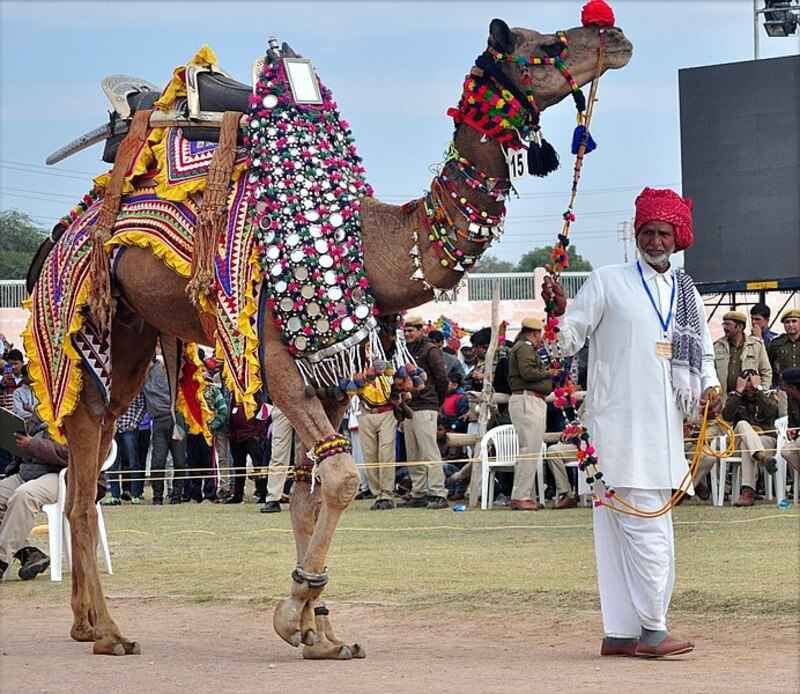
Special highlights of the festival:
- Since a lot of visitors attend this festival, the state tourism department puts up a tourist village to provide accommodation.
- Camps, tents and the set up of bonfire adds up to the excitement of staying in a desert.
- The main attraction of the fair is the Mirchi Bazaar (Red chilly market), which is an interesting place for shopaholics to buy wooden items, leather articles, handicrafts, traditional jewellery.
- Animals are decorated in the best possible way, and a beauty contest is conducted to select the best animal.
- Visitors can try the local cuisine, especially sweets, and tea made up of camel milk.
- The night gets beautifully lit up with fireworks in the sky, making it an event to remember.
Pushkar Fair Rajasthan
About Pushkar Fair
While Rajasthan is known for its various colourful festivals, Pushkar festival or the Pushkar Camel Fair is one among the best of all. Every year lakhs of visitors hoard this place to witness the country largest camel, horse and cattle fairs. Just like any other fair, this one too has a display of livestock, wherein owners bring in their camels, horses, cows, goats and sheep all adorned beautifully to be sold and purchased. Organized during the sacred full moon day, Pushkar fair attracts a lot of international tourists who are fascinated to see cattle trade in such a large scale. Entertainment programmes like Rajasthani art, dance, music performed by the turbaned men and women wearing colourful skirts also add to the charm of the fair.
Well, this isn’t it; Pushkar fair is also known for its religious significance. Pushkar Lake is one of India’s holy lakes. Every year during the holy month of Kartik (as per Hindu calendar) thousands of pilgrim and priests visit this lake to pay their respect to Lord Brahma. It is believed that a dip in the lake washes away all the sins.
Dates of the festival: November 22 – 30, 2020
It is celebrated annually for seven days in November, during the full moon day.
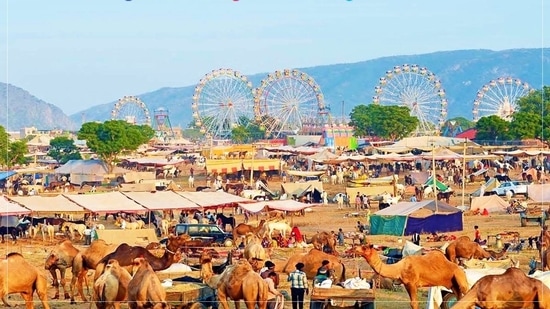
Special highlights of the festival:
- The opening ceremony marked by the parade of these royal looking camels and horses is an experience in itself.
- Several amazing competitions are held during the fair which includes tug of wars, longest moustache competition, camel races, camel beauty pageant etc.
- The fair also provides an unforgettable stay experience in the tented camps.
- Adventurous activities like hot air ballooning, horse riding, quad biking are the experiences on offer.
- During the fair a harmony half marathon is also held which should not be missed.
- Visitors can purchase delightful handicrafts, traditional silver ornaments, printed textiles, traditional footwears, souvenirs etc.
Elephant Festival
Where: Jaipur
Duration of Festival: 1 day
Special attractions: Traditional procession of decorated elephants
Here comes Holi and the best manner to celebrate it in Rajasthan is by being a part of the Elephant festival. This parade is considered as a symbol of Rajasthan royalty. This event begins with a huge procession of large and beautiful elephants. For this special day, elephants are groomed, painted, dressed and embodied with heavy ornaments like gold. All the participants of this festival are female elephants and they take part in race, tug of war and polo. The festival pulls huge crowd and is loved by all. Beside this, there are live musical and dance performance too.
Mewar Festival Udaipur Rajasthan
Famous for its age-old legacy, Mewar Festival boasts the rich tradition culture, and heritage of Mewar Region.
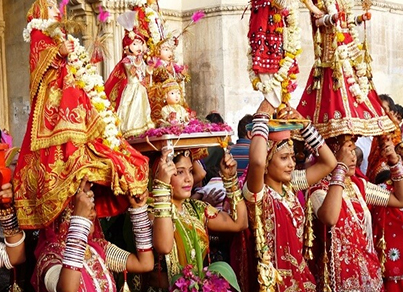
About Mewar Festival Udaipur Rajasthan
At the arrival of the spring season, the city of Udaipur gears up for its annual Mewar festival which is celebrated with a lot of zeal and enthusiasm. Since Udaipur has been the governing city of the Mewar rulers, the festival holds importance among the locals. The city gets decorated at its best and the local shops and markets are seen beautifying their facade with impressive lightings and colours. Women are also decked up in their finest attires flaunting traditional jewellery and mehendi on their palms and feet. As a part of the tradition they all gather to dress up the idols of Lord Shiva and Goddess Parvati. After which a procession takes place in which the women carry idols on their heads and pass through different parts of the city. The procession comes to its final halt near Lake Pichola and the idols are transported into special boats which then get immersed in the middle of the lake. Witnessing these series of traditional rituals is truly a sight to behold. After the completion of these rituals cultural activities begin with full excitement. It is enriching to watch locals perform dance and dramas, along with some fine performances by the singers and musicians. While all the locals and tourists enjoy every bit of the festival for all the three days, the Mewar Festival gets a royal closure by displaying colourful fireworks in the sky.
Dates of the festival: Mewar Festival is celebrated for three days in the month of April
Special highlights of the festival:
- Mewar Festival is considered as the second World living Heritage festival of India.
- Married women pray for marital bliss and good health of their partner while the unmarried ones pray for an ideal match.
- The traditional sweet named Ghevar is prepared as an offering to the Lord and then gets distributed among each other as Prasad.
- Professional chefs display an array of colourful presentation of food and beverages in Mewar style.
- Colourful rangolis are made which display the various aspects of Mewar region.
Winter Festival of Mount Abu
Boasting exquisite handicrafts, spectacular folk-dance performances and sporting activities, the Winter Festival at Mount Abu is an awe-striking extravaganza in Rajasthan.

About Winter Festival of Mount Abu
Jointly organized by the Rajasthan Tourism Development Corporation and the Municipal Board of Mount Abu, the Winter Festival aims to showcase the rich culture and heritage of Rajasthan and offers tourists a delightful vacation amidst some stunning vistas. The three-day festival begins with a lavish parade through this hill station in Rajasthan that ends at the famous Nakki Lake. A ceremony is performed at this lake called the Deepdan, in which, hundreds of earthen lamps (Deep) are lit and set afloat on it. This occasion is a photographer’s delight and a feast for the eyes.
The Winter Festival features various classical and folk song performances by artists from Rajasthan and other states of Northern India. The Festival is also renowned for its Sufi Kathak and numerous traditional Rajasthani folk dance performances like Ghoomar, Daph and Gair. Soothe your nerves by listening to the mesmerizing Shaam-e-Qawwali and some amazing classical poetry recitations.
For adventure buffs and sports enthusiasts, the Winter Festival is a paradise. From many popular sports like Cricket to horse racing to activities like tug of war, kite flying, rowing and skating, the festival offers a plethora of opportunities for an exciting vacation.
Festival Dates/Months: The Winter Festival at Mount Abu is held once every year in the last week of December, that is, from 29-31 December.
Highlights of the Winter Festival:
- The Winter Festival at Mount Abu is a three-day festival held every year.
- It is one of the few festivals in India to include Cricket in its list of activities.
- The Festival is famous for its spellbinding fireworks display in the evening.
- It offers the opportunity to shop for authentic handicrafts.
- A soulful live band performance by the CRPF can be witnessed in the festival.
Mahashivratri
Where: All over Rajasthan
Duration of Festival: 1 day
Special attractions: Shiv temple decoration in colourful manner
Mahashivratri is considered as the most auspicious festival and celebrated all over India. Lots of mythological beliefs are associated with this festival. Lord Shiva is facilitated with honey, flowers and bel leaves. Most of the women keep a vigilant fast on this day. Celebrations take place throughout the night, and people keep on chanting devotional songs; devotees also take a dive dip in the holy River ‘Ganga’
Holi
Where: All over Rajasthan
Duration of Festival: 2 days
Special attractions: festival of colours
The colourful state of Rajasthan celebrates Holi much the same way as Mathura. Crowds of people come together before the full moon night and light huge bonfires to burn the residual dried leaves of the winter. On the second day, people throw coloured water and powders (gulal and kumkum) at each other and make merry. Singing, dancing and the traditional beats of dhol add to the gaiety of the occasion.
Gangaur Festival Rajasthan
Honouring Lord Shiva and Goddess Parvati, Gangaur Festival is a celebration of marital bond and prosperous life.
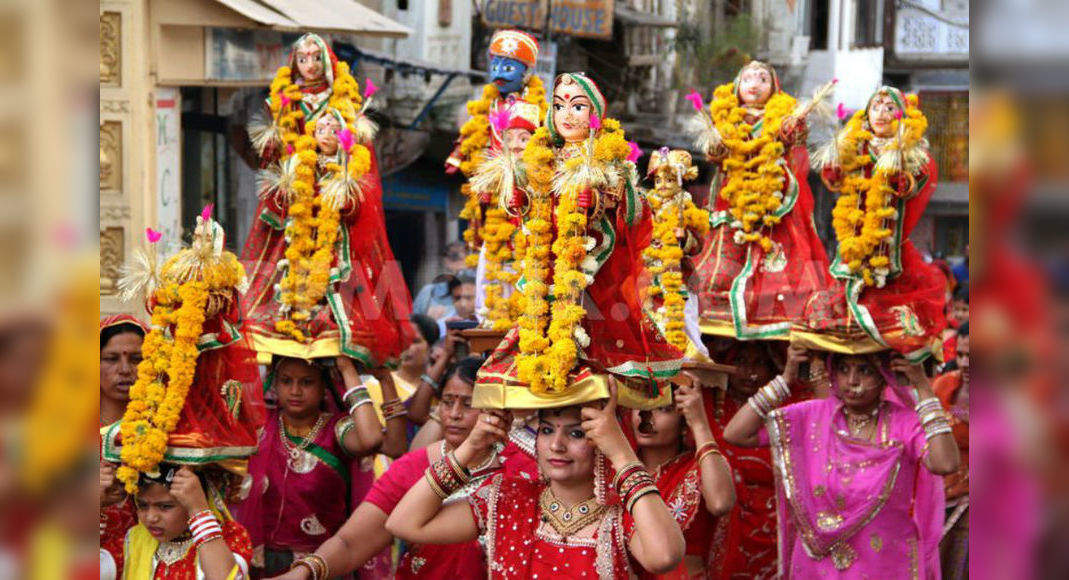
About Gangaur Festival Rajasthan
Celebrated widely in Jaipur, Udaipur, Jodhpur, Jaisalmer, Bikaner and Nathdwara, Gangaur Festival is amongst the top festivals of Rajasthan. The word Gangaur is derived from Lord Shiva and Goddess Gauri. The festival holds a lot of religious importance for married and unmarried women who worship Goddess Gauri for the prosperity and long life of their spouse, while the unmarried ones pray for getting a good match. The festival commences on the subsequent day of Holi which is celebrated for the next 18 days. Women make clay idols of Goddess Parvati and worship her every morning. They also sow wheat in earthen pots and water it religiously until the seeds start germinating, this is a very important ritual of the festival. Women are seen dressed in their best colourful attire and jewellery and also decorate their palms with henna. On the 7th day the unmarried women carry the pots on their heads with a lamp lit inside and are blessed by elders with gifts. One day before the last day, parents of married women also send certain gifts to their daughter. On the last day, women carry pots and the idols on their heads and walk through the streets. By breaking the pots and immersing the idol in the water marks the departure of Goddess Gauri.
Dates of the festival: The festival is celebrated annually between March-April. It is celebrated for 18 days starting the following day of Holi
Special highlights of the festival:
- Married women fast for all the 18 days, while unmarried women eat only one time in a day.
- Women make special Gauri clay idols, while some make permanent wooden images. Goddess Gauri is decorated in the best possible way.
- Cultural activities like Rajasthani dance and songs are performed by the women.
- The last day is like a feast marking the end of the festival and lighting fireworks in the sky.
- In many tribal communities this festival is considered as a match making day.
- A popular Rajasthani sweet name Ghevar is made and distributed to all as a celebration.
Summer Festival Mount Abu Rajasthan
A one-of-its-kind festival of Mount Abu, the Summer Festival is an apt representation of Rajasthani culture, art and its tribal life.
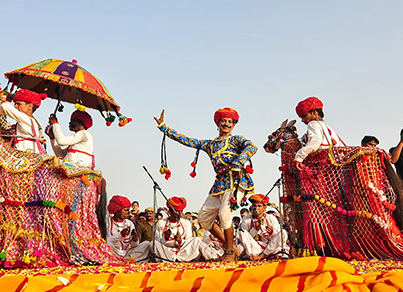
About Summer Festival Mount Abu Rajasthan
Mount Abu which is the only hill station of Rajasthan and blessed with a pleasant weather throughout the year. Its natural beauty, captivating hill rocks, lush green landscape and serene lakes set the perfect mood to celebrate the Summer Festival with great enthusiasm. Being the most popular festival of Mount Abu, it gives the town a complete festive makeover. Celebrated just before the advent of monsoon season, the festival has the zest and fervour that can be believed to be infectious. This annual extravaganza of cultural activities brings out the best of Rajasthan’s art and tradition.
Since Mount Abu is associated with various religious and mythological stories, the first day of the festival usually coincides with the Buddhist Festival of Buddha Poornima. The two-day festival is full of interesting activities, dance, music, competitions, shows and fireworks. The festival commences with musicians singing Ballads followed by traditional folk dance. The celebration then proceeds to the popular Nakki Lake where the exciting boat race is organized. Second day becomes more interesting as various competitions are organized which includes skating race, tug of war, boat race, horse race, CRPF show, matka race etc. Evenings gets musical touch with the Shaam-E-Qawwali performed by the well-known singers of the state. At the end of the festival the sky-dazzling fireworks spreading all over the sky look incredibly magical.
Dates of the festival: Summer festival is celebrated for two days in the month of May. It starts during the Hindu festival of Buddha Poornima.
Special highlights of the festival:
- While there are various folk dances performed during the festival,Ghoomar is the most popular of the all.
- Nakki Lake hosts the boat race on the second day.
- Various food stalls are set up all over the place where visitors can relish local cuisine.
Urs Fair
Where: Ajmer
Duration of Festival: 6 days
Special attractions: Night-long dhikr/zikr qawwali singing
During this festival thousands of pilgrims, Sufis and tourists head to Ajmer in Northern Rajasthan to celebrate the festival of Urs, to commemorate the death anniversary of Moinuddin Chisti. Music in the form of quawwalis is constantly performed both in the dargah compound as well as outside its gates. The entire city is decorated with lights and frills.
Guru Purnima
Where: All over Rajasthan
Duration of Festival: 1 day
Special attractions: Thanksgiving ceremony
This is the day when you can thank everyone who has taught you spiritual lessons in life. It is celebrated on the full moon day in the Hindu month of Ashad
Teej Festival Rajasthan
Celebrating the holy union of Lord Shiva and Goddess Parvati, Teej in Rajasthan is a monsoon festival for women.

About Teej Festival Rajasthan
As an important monsoon festival in Rajasthan, Teej is celebrated on the third day of the waxing moon in the month of Shravan (Hindu calendar), and on the third day of the waning and waxing moons in the Hindu month of Bhadrapad. However, Rajasthan is not the only state Teej is celebrated in, many other states in the north and west India observe this monsoon festival held in August and September. Although, it is fair to say that Teej is celebrated with great zeal and enthusiasm in the desert state of Rajasthan. Ideally, there are three Teej festivals, namely, Haryali (Green) Teej, Kajari/Kajli Teej and Hartalika Teej.
According to Hindu mythology, after the self-immolation of Sati, Lord Shiva became grief-stricken and went into a meditative state. It is believed, it took Sati 108 subsequent births to bring Lord Shiva out of his meditative state. Her 108th birth was in the form of Parvati. Thus, married women seek the blessings of Goddess Parvati on Teej Festival for marital bliss.
On the occasion of Teej Festival, women observe a fast and pray through the night. In the morning, they bathe and dress in red sarees and fine jewellery to worship Goddess Parvati. The major attractions of Teej Festival are the swings that are fixed to the branches of large trees, on which the women take turns to enjoy swinging. Special songs are sung, and the women decorate their hands with henna. Married daughters are presented with sweets and clothes by their mothers. The girls engaged to be married receive gifts of henna, bangles, clothes, and sweets from the in-laws.
Although the festival is celebrated across the length and breadth of the state, Jaipur makes for an ideal place to see the celebration of Haryali Teej. A two-day procession is held in the city that is worth a watch. On the other hand, Bundi in Shekhawati Region is the best place to visit during Kajari.
Festival Dates/Months: Every year, the festival of Teej is celebrated in the months of August and September in Rajasthan and other north Indian destinations.
Special Highlights of the Festival:
- The festival is special for married women
- Swings are fixed in the branches of tree for married women
- In Jaipur, a two-day procession is carried out on Haryali Teej
- Women decorate their hands with henna and wear red sarees
- Prayers are offered to Goddess Parvati to seek her blessings for marital bliss
- The girls to be married receive gifts from their in-laws
- Married daughters receive presents from their mothers
- Special songs are sung and pooja(worship) is observed
Raksha Bandhan
Where: All over Rajasthan
Duration of Festival: 1 day
Rakhi reflects the sweet relationship of a brother and a sister. All the girls tie a thread on their brother’s wrist and in-return all brothers give a promise to their sisters that they will protect them always. This is a special day to celebrate the emotional bonding of siblings. The ritual is observed on the full moon day of the Hindu month of Shravan
Marwar Festival Rajasthan
A two-day festival celebrated in the Blue city of Jodhpur, to honour the valour and bravery of Rajput kings and warriors.
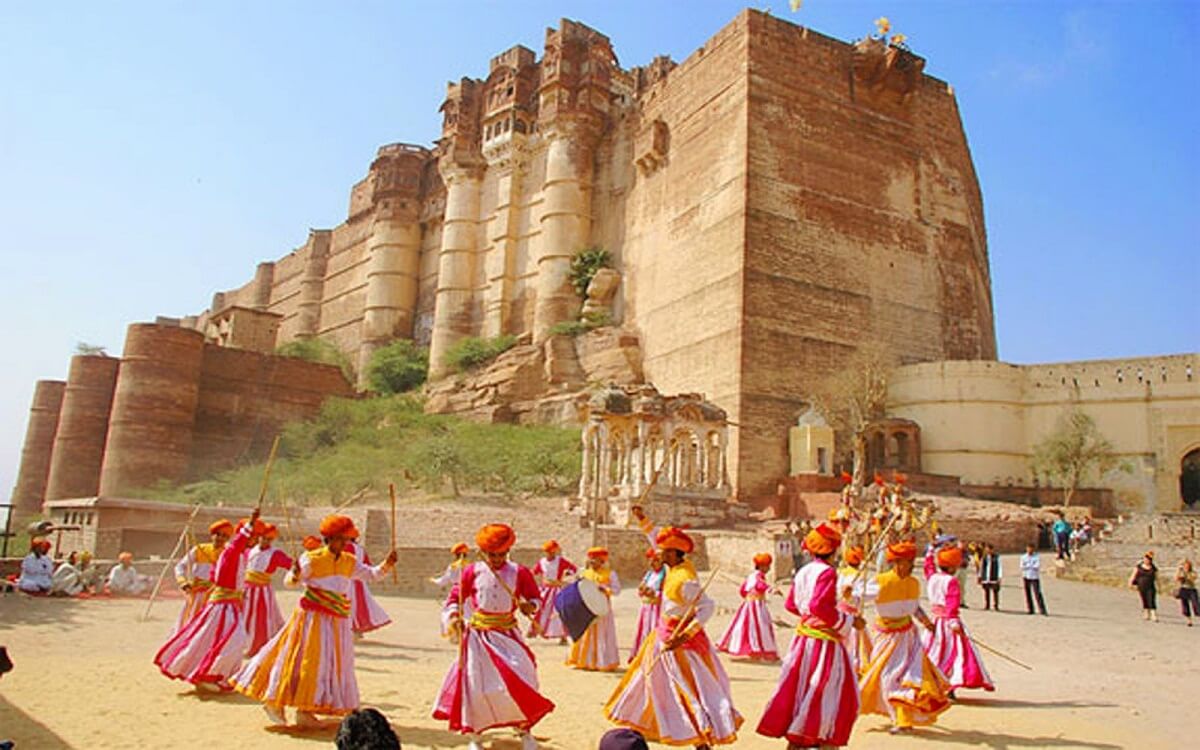
About Marwar Festival
Rajasthan’s unique collection of eclectic and colourful festivals makes it one of the preferred tourist destinations not only among Indians but also for the global travellers. One such power packed festival is Rajasthan’s Marwar festival which is celebrated annually in the city of Jodhpur. The festival acts as a tribute to the Rajput heroes and their glorious past, thereby gaining a lot of knowledge about the heroes of the bygone era of Rajasthan. Marwar festival is a perfect display of art and culture of Jodhpur city and is dedicated to the songs, music and dance of the Marwar region. The eye catching characteristics of the folk dancers dressed in their radiant colourful costumes and the sight of carrying pots on their heads fills the environment with the aroma of zeal and enthusiasm. Along with these various fun activities like puppet shows, magic shows, camel tattoo show, horse riding and horse polo keep the visitors engaged.
Dates of the festival: October 12-13, 2020
Marwar festival is celebrated for two days on a full moon day which usually falls in the month of September or October.
Special highlights of the festival:
- Apart from the common Rajasthani folk dance, Dandi Gair (folk dance performed with a stick), Kalbelia (performed by snake charmer community), Ghoomar (a dance form with repeated circular patterns) and performed.
- The festival also hosts one of the largest fairs of Rajasthan. Some of the best handicrafts, artefacts, souvenirs are displayed.
- Marwar festival witnesses best of local snacks and delicacies which becomes an important reason to attend this festival.
Navratri
Where: All over Rajasthan
Duration of Festival: 9 days
Considered as the most auspicious 9 days of the Hindu calendar, Navratri is celebrate with great fervour and verve all across Rajasthan. Worship and fasting takes place during the day time while the nights are reserved for feasting and dancing.
Ashwa Poojan
Where: Udaipur
Duration of Festival: 1 day
Special attractions: Worshipping the Horse
On the 9th day of Navratri, a regal festival for the worship of horse is organized in Udaipur. This one of its kind festival acknowledges the special relationship between honour and horse. During this festival, the horse is worshiped by the eldest member of the house; the religious ceremony is followed by a mouth-watering Rajasthani cuisine treat.
Dussehra Festival Rajasthan
Symbolizing the triumph of good over evil, Dussehra is a festival that is not only celebrated in Rajasthan but all around the country.
About Dussehra Festival
This Hindu festival commemorates the killing of Ravana (an evil king from Sri Lanka) by God Rama (an incarnation of Lord Vishnu). The festival is preceded by nine days Navratri celebration in which Goddess Durga is worshipped in order to seek her blessings for a good harvest season.
According to Hindu mythology, Ravana abducted Sita, the consort of Lord Rama while they were in exile. Lord Rama not only killed Ravana but also established an indelible reason for the Hindu devotees to celebrate his triumph as a day of Dussehra. For the celebration of Dussehra, large effigies are created which are later burned to ashes as a symbol of the defeat of the evil. All around the country, these effigies are made and burned; prayers are also offered and plays are performed as a part of the celebration both in Rajasthan as well as across the country.
The large size of the effigies of the ten-headed Ravana, Kumbhkarna (Ravana’s brother), and Meghnath (Ravana’s son) make the celebration of Dussehra in Kota, Rajasthan exceptional. The effigies are about 75 feet in height making them the highest in India. A fair is also held in Kota around Dussehra festival where artisans from across the state come. Apart from Kota, Jaipur also celebrates Dussehra with all pomp and show.
Festival Dates/Months: Dussehra is celebrated in the month of October or November, however there is no fixed date.
Special highlights of the festival:
- Large effigies of Ravana, Meghnath, and Kumbhkarna are built and burned on Dussehra
- Plays based on the killing of Ravana by Lord Rama are performed
- In Kota, the highest effigies of 75 feet are built
- A fair is held in Kota on Dussehra
Diwali
Where: All over Rajasthan
Duration of Festival: 5 days
Special attractions: Festival of lights, firework
Considered as the festival of lights, Diwali is celebrated as the homecoming of Lord Rama. This 5 day long carnival is celebrated with great enthusiasm. Houses and shops are given a rigorous spring clean before being lovingly decorated with fairy lights, patterned lanterns and colourful rangolis/kolams. Puja is organized in the evening to seek the blessings of Devi Lakshmi. After the religious ceremony, people share sweets with family and neighbours, followed by splendid fireworks. People exchange gifts and enjoy them as much possible. These 5 days are considered very auspicious as people purchase utensils and cloths, some even start new business during this time.


